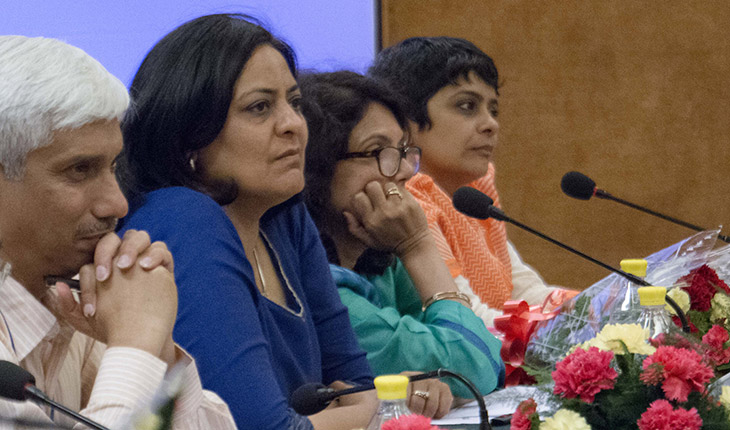The Health Policy Project ended in 2016. Work continued under Health Policy Plus (HP+) until 2022.
NEWS & VIEWS

Photo by Satvir Malhotra
May 15, 2015
NEW DELHI, India—The USAID- and PEPFAR-funded Health Policy Project (HPP) /India held a symposium in New Delhi on May 12, 2015. The event brought 25 representatives from state governments, academic/research institutions, nongovernmental organizations, and civil society organizations together with a distinguished group of speakers to discuss HPP/India’s work since 2011—particularly in the states of Uttarakhand, Jharkhand, and Uttar Pradesh. The presentations summarized project experiences, achievements, and lessons learned, as well as strategies for policy stewardship and systems strengthening going forward.
R. K. Srivastava, MD, senior policy analyst at the Health Policy Unit of the National Institute of Health and Family Welfare (NIHFW), described HPP/India’s efforts to set up the unit as a hub for evidence-informed policy analysis, advocacy, and dialogue and to bring stakeholders together for health advocacy. From using simulation models to project population trends for bureaucrats and parliamentarians to conducting studies on public health fund allocation and use, Dr. Srivastava said that the unit has exemplified best practices in institutionalizing capacity development.
Amit Ghosh, director of the National Health Mission in Uttar Pradesh (UP), offered a case history of piloting innovative public-private partnerships (PPPs) in his state for such enterprises as voucher schemes and “socially franchised clinics” for family planning and reproductive health services. The Health Policy Unit and HPP/India worked with civil society and social marketing organizations to support these partnerships through state-level dialogue and evidence-sharing. Mr. Ghosh said the UP government’s new web portal, “Hausla Sajhedari” (Trust and Partnership), provides a transparent system for private health ventures to submit and monitor applications to the government for accreditation and reimbursement.
Arachana Srivastava, MD, additional director of national programs for the state government of Uttarakhand, recounted the steps her state took to strengthen policy and planning. With sustained advocacy by the Health Policy Unit and HPP/India, the government improved financial efficiencies by examining the allocation and use of National Health Mission funds; built capacities to improve the quality of district health action plans; and strengthened bottom-up planning. Dr. Srivastava mentioned HPP/India’s significant role in helping the state to revise its policy on health and population.
Heer Chokshi of HPP/India discussed achievements of the project’s capacity building, mentoring, and supportive supervision program: “It increased the availability of contraceptive commodities nationwide; for example, supplies of emergency contraceptive pills in health units increased from 18 percent to 55 percent. It also increased the availability at community health centers of doctors trained in clinical family planning services from 64 per cent to 73 percent.”
Sheena Chabbra, chief of the Health Systems Division at USAID/India, pointed to three critical things that HPP/India has done well: institutionalizing capacities for evidence-informed advocacy of health policy; ensuring effective partnerships in all activities; and assembling the best technical expertise from around the world for evidence-informed advocacy. J. K. Das, director of the NIHFW, emphasized the importance of sustaining these contributions. Health decisionmakers require considerable and ongoing capacity development, he said, because the health field is vast and presents shifting challenges. To secure the Health Policy Unit’s continued support for NIHFW’s work, he said, the institute will soon present a case to the standing finance committee for funding the unit through the National Health Mission.
Mr. Ghosh, for his part, added that he is committed to setting up a health policy unit in his state of Uttar Pradesh, and to replicate there a model for health systems strengthening that HPP/India successfully established in the state of Jharkhand.
What's New
- Something to Build On: “Innovation Exchange” Celebrates the Health Policy Project’s Close and a New Beginning
- What Will it Take for Tanzania to Achieve ART Targets and Ensure Long-Term Sustainability of the HIV Response?
- Helping Kenya’s County Leaders Advocate for Increased Health Investments
- HPP Holds Working Meeting on Ensuring Responsible PEPFAR Transitions for Key Populations
- Health Policy Project Celebrates 2016 International Women's Day
- HPP Staff Participate in White House Conference on HIV Stigma Reduction

